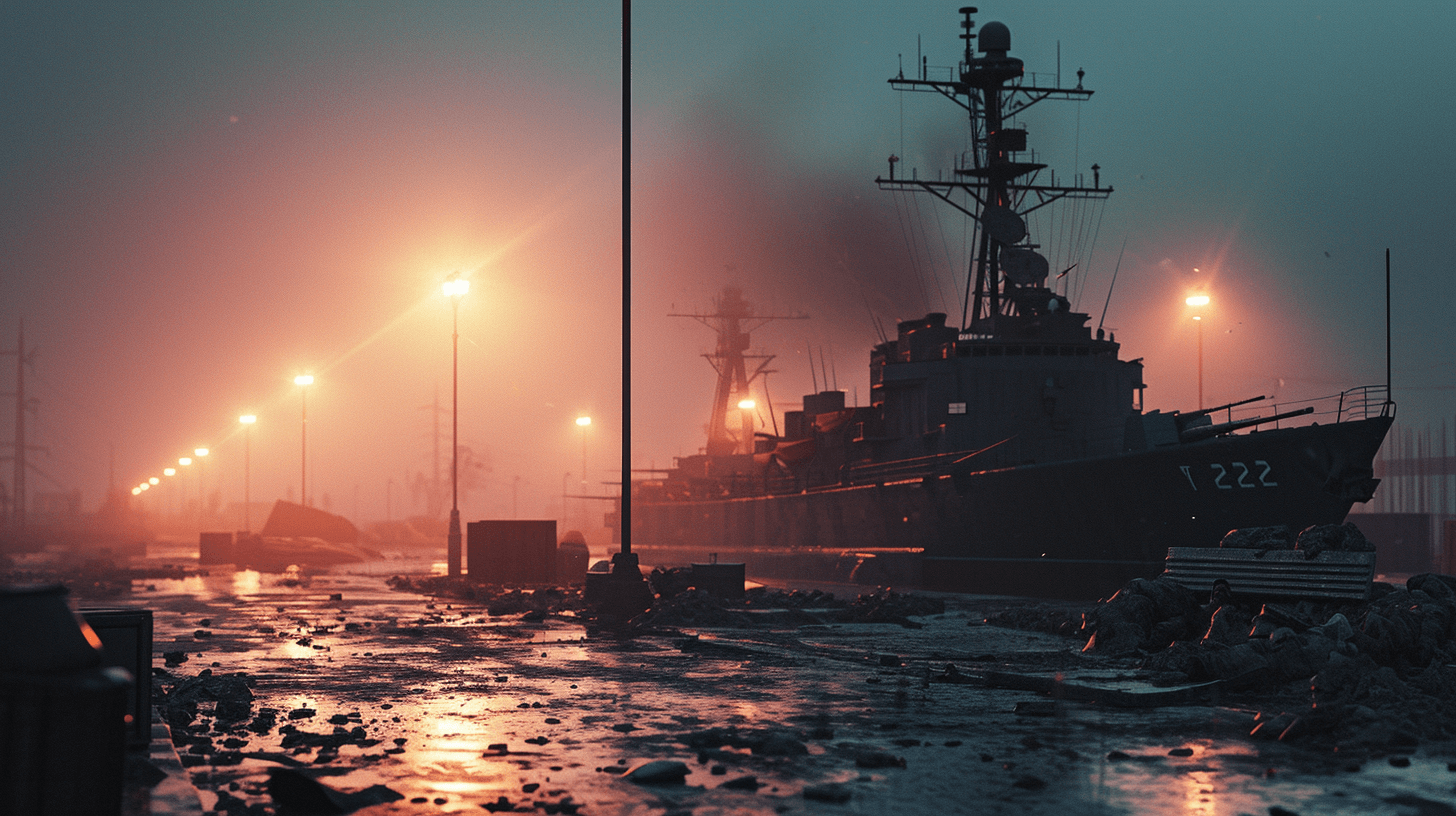Da Middle East Sea Talk: U.S. & Bahrain vs. Houthis 🌊🚢
⬇️ Pidgin | ⬇️ ⬇️ English
Howzit, gang! Get choke action going down in da Middle East waters, and guess who’s right in da middle? Uncle Sam and little Bahrain, trying for deal with Yemen’s Houthi rebels. Da big question: where’s da rest of da Middle East powers?
When Secretary of Defense Lloyd J. Austin III wen’ announce dis U.S.-led naval task force for face da Houthi threat in da Red Sea, was like one ghost town. No more other big players from da region joining in, just Bahrain. Da silence from da other Middle East capitals? Loud and clear, brah. 🌍💬
Da kine trade through da Red Sea is super important for many Arab countries. Goes all da way from da Suez Canal to da Bab al-Mandeb Strait by Yemen. But with America’s strong kine support for Israel’s Gaza war, looks like no Middle East country like join hands with da U.S. in this military gig. Like they saying, “Eh, no like be part of dis.”
According to Dr. Sanam Vakil from Chatham House, da Middle East and North Africa program director, da Arab states feeling kinda awkward. They no like be seen as backing up Israel’s actions in Gaza.
Iran, backing up da Houthis, been da loudest voice against da U.S. effort. They calling any joining of da coalition as being part of “da crimes of da Zionist entity.” But, Iran also trying for play it smooth, saying da Houthis doing their own thing, not to make Uncle Sam more mad. 🇮🇷🔊
Even those states whose pockets depend on keeping da shipping lanes safe, they just watching from da side. Five big shipping companies already saying, “No thanks” to da Red Sea.
Egypt, making big bucks from da Suez Canal traffic, just monitoring da situation. Jeddah port in Saudi Arabia, handling most of Saudi’s business, sits right on da Red Sea. Even though da Saudi Crown Prince, Mohammed bin Salman, is all for making da economy more varied, Saudi Arabia’s mixup with da Houthis goes way back, even before da Gaza war. After years of fighting, Saudis more interested in peace talks than jumping into new scrap. 🇸🇦🕊️
Da U.S. and Saudi talks get different kine stories. U.S. side says they talked about joining forces against Houthis, but Saudi side more focused on Gaza.
Oman, da middleman between da world and da Houthis, says “Gaza first” before pushing Houthis to chill on da attacks.
But, get choke countries ready for back up da task force, including Britain, Canada, France, Italy, da Netherlands, Norway, Seychelles, and Spain. Bahrain, hosting one American naval base and recently making one security deal with da U.S., and da United Arab Emirates, who been fighting da Houthis in Yemen, also in. 🌐🤝
Behind da scenes, plenty Arab states happy for see da U.S. go up against Iran’s proxy forces, Dr. Vakil says.
Iran been flexing, saying da Houthis part of their “Axis of Resistance” with groups like Hezbollah and Hamas. Iran’s defense minister even wen’ warn, “Da Red Sea is our turf.”
Disrupting Western trade, upping oil prices – dat’s Iran’s game. But they no like make da Gaza conflict turn into one bigger war.
Iran trying for say they not directly involved with Houthis’ ship attacks. But da Houthi promise to block help to Israel as long as Gaza beef stays, shows they not just sitting back.
Now, da world’s biggest shipping companies rerouting from da Red Sea, going around Africa instead. Da delays and extra costs might hit everybody’s wallet with higher prices for oil and stuffs we buy.
Most of da drones and missiles targeting ships been missing or getting stopped by U.S. and French ships. But da Houthis did hit one Norwegian tanker, causing fire but no hurt.
Da U.S. Navy sent more ships for protect da area and help Israel. Da attacks raising worry about one bigger fight in da region. Israel’s Gaza action killing about 20,000 people, and Iran-backed militias been promising support for Hamas since they wen’ hit southern Israel.
Arab leaders and da U.S. and its allies talking story for avoid one bigger war, pushing for cease-fire and more help for da people.
Defense Secretary Austin said these attacks messing with business, putting sailors in danger, and breaking international law. He was in Israel, talking about U.S. support but also pushing for more targeted actions to lower civilian risk. Inside Israel and among its allies, people questioning da high death toll in Gaza.
So, da situation stay complex, with da U.S. and Bahrain up against da
Houthis, and everybody else kinda watching from da sidelines. Da Middle East waters stay hot, and da world stay watching. 🌊🚢👀🌍🔥
NOW IN ENGLISH
Middle East Sea Drama: U.S. and Bahrain Confront Houthis 🌊🚢
Hello everyone! Big news from the Middle East waters – the United States and Bahrain are teaming up to tackle the threat from Yemen’s Houthi rebels. But guess what? They’re pretty much on their own in this endeavor. When Secretary of Defense Lloyd J. Austin III announced this U.S.-led naval task force to confront Houthi threats in the Red Sea, there was a striking absence of other Middle East powers.
Bahrain, a tiny island state, is the sole Middle Eastern country stepping up. The silence from other regional capitals is quite telling. 🌍💬
For many Arab countries, the Red Sea trade is crucial. It stretches from the Suez Canal to the Bab al-Mandeb Strait near Yemen. However, given the United States’ vocal support for Israel in the Gaza conflict, it seems no other Middle Eastern country wants to be involved in a U.S.-led military venture.
Dr. Sanam Vakil from Chatham House points out that Arab states are in an awkward position. They don’t want to appear as endorsing Israel’s actions in Gaza in any way.
Iran, a staunch supporter of the Houthis, has been vocally opposed to the U.S. initiative. They’ve condemned joining the coalition as complicity in “the crimes of the Zionist entity.” Yet, Iran is also trying to maintain a balance, claiming the Houthis are acting independently, to avoid direct conflict with the United States. 🇮🇷🔊
Despite the importance of keeping shipping lanes secure, states whose economies rely on this trade are holding back. This is while five major shipping companies have already decided to steer clear of the Red Sea.
Egypt, which earned a record $9.4 billion from Suez Canal traffic last year, has only stated that it is monitoring the situation. Saudi Arabia, with its key port of Jeddah on the Red Sea and its coastline central to economic diversification efforts, has a complicated history with the Houthis and is more inclined towards peace talks than new confrontations. 🇸🇦🕊️
Discussions between the U.S. and Saudi Arabia have highlighted differing priorities, with the U.S. emphasizing cooperation against the Houthis and Saudi Arabia focusing on Gaza.
Oman, known for mediating between the international community and the Houthis, is prioritizing a Gaza ceasefire over pressuring the Houthis to cease their maritime attacks.
The task force, however, does have support from other countries, including Britain, Canada, France, Italy, the Netherlands, Norway, Seychelles, and Spain. Bahrain, hosting a U.S. naval base and having a recent security agreement with the United States, and the United Arab Emirates, involved in the long war against the Houthis in Yemen, are part of the coalition. 🌐🤝
Privately, many Arab states are content to let the United States confront one of Iran’s proxy forces, according to Dr. Vakil.
Iran has been showcasing its influence, mentioning the Houthis as part of its “Axis of Resistance,” alongside groups like Hezbollah and Hamas. Iran’s defense minister even issued a warning about controlling the Red Sea, highlighting the strategic importance of the region.
The disruption of Western trade routes aligns with Iran’s strategy to confront the United States and its allies, with any escalation in oil prices benefitting Iran. However, Iran is cautious about escalating the Gaza conflict into a wider regional war.
Iran has attempted to distance itself from the Houthis’ maritime operations, portraying them as independent actors. Still, the Houthis’ commitment to hinder aid to Israel as long as the Gaza conflict persists shows their involvement.
Global trade and oil shipments are being impacted as the world’s largest shipping companies reroute vessels away from the Red Sea. This shift is leading to delays and additional costs that could globally drive up oil prices and other imported goods.
So far, most drone and missile attacks on commercial ships have been unsuccessful, but the Houthis did strike a Norwegian tanker, causing a fire without any injuries.
The U.S. Navy has increased its presence in the area to protect shipping lanes, defend U.S. personnel in the Middle East, and support Israel. The ongoing attacks and Israel’s prolonged bombardment of Gaza, killing about 20,000 people, are raising concerns about a broader regional conflict.
Arab leaders and the United States and its allies are working to prevent a wider war, pushing for a cease-fire in Gaza and more humanitarian aid.
Defense Secretary Austin has emphasized that the attacks threaten commerce, endanger mariners, and violate international law. His recent visit to Israel marked a shift in tone, reassuring U.S. support against Hamas but urging a more targeted approach to minimize civilian casualties. Concerns are growing over the high death toll in Gaza and the accidental killing of hostages by the Israeli military.
In summary, with the U.S. and Bahrain up against the Houthis and other countries
largely observing from the sidelines, the Middle East waters remain a hotspot of tension and strategic maneuvering. 🌊🚢👀🌍🔥







